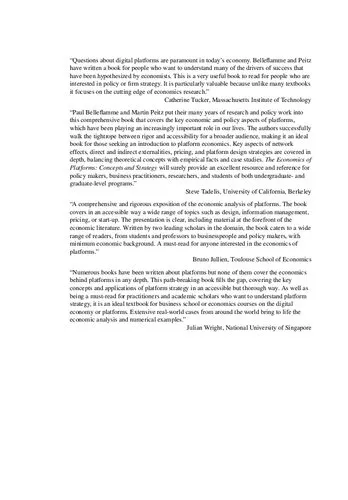The economics of platforms : concepts and strategy
4.0
بر اساس نظر کاربران

شما میتونید سوالاتتون در باره کتاب رو از هوش مصنوعیش بعد از ورود بپرسید
هر دانلود یا پرسش از هوش مصنوعی 2 امتیاز لازم دارد، برای بدست آوردن امتیاز رایگان، به صفحه ی راهنمای امتیازات سر بزنید و یک سری کار ارزشمند انجام بدینکتاب های مرتبط:
معرفی کامل کتاب "The Economics of Platforms: Concepts and Strategy"
کتاب "The Economics of Platforms: Concepts and Strategy" که به قلم پل بلفلام (Paul Belleflamme) و مارتین پیتز (Martin Peitz) به رشته تحریر درآمده، اثری بیبدیل در زمینه تحلیل اقتصادی پلتفرمها در دنیای دیجیتال و اقتصاد شبکهای است. این کتاب مرجعی جامع برای درک ساختار، عملکرد، و استراتژیهای کلیدی پلتفرمهاست و نقش مهمی در تحول اقتصاد مدرن ایفا میکند. نویسندگان با رویکردی دقیق و علمی، مفاهیم پیچیده را به شیوهای ساده و کاربردی ارائه کردهاند که مخاطب اعم از دانشجویان، پژوهشگران، و مدیران ارشد کسبوکارها بتوانند از آن بهره ببرند.
خلاصهای از محتوای کتاب
در این کتاب، نویسندگان توضیح میدهند که پلتفرمها چگونه با استفاده از اقتصاد شبکهای (Network effects) و طراحی روابط چندجانبه (multi-sided markets)، ارزشآفرینی میکنند. در فصلهای کتاب، توضیح داده میشود که چگونه شرکتهای موفق مانند Amazon، Facebook، Google، و Uber از مزایای این مدلها بهرهمند شدهاند.
این کتاب همچنین به مفاهیمی از جمله نحوه قیمتگذاری پلتفرمها، تضمین امنیت و جلوگیری از رفتارهای منفی کاربران، مدیریت رقابت میان پلتفرمها، و تحلیل استراتژیهای رشد میپردازد. نویسندگان دیدگاه گستردهای نسبت به قوانین و مقررات نیز ارائه دادهاند که نقش حیاتی در هدایت پلتفرمها دارد.
نکات کلیدی کتاب
- تعریف و تشریح اصول پایهای اقتصاد پلتفرم
- تحلیل اثرات شبکهای مستقیم و غیرمستقیم
- استراتژیهای رشد و گسترش بازارهای دوطرفه
- روشهای مدیریت تعارض و تعامل در پلتفرمها
- ارائه بینشهایی درباره سیاستهای مقرراتی و نظارتی
جملات معروف از کتاب
“A platform is not a business; it is a different way to orchestrate and leverage an ecosystem of value creation.”
“The success of a platform often depends on its ability to balance the interests of different groups of participants.”
“Regulation, when properly designed, can foster innovation instead of stifling it.”
چرا این کتاب مهم است؟
اهمیت این کتاب در چند جنبه خلاصه میشود. نخست، این کتاب چارچوبی تحلیلی برای درک و مطالعه اقتصاد دیجیتال و تحولات فناوری ارائه میکند. در دنیایی که پلتفرمها در حال بازتعریف مرزهای اقتصادی هستند، این کتاب به ما اجازه میدهد درک عمیقی از نحوه کارکرد آنها به دست آوریم.
از سوی دیگر، وجود مثالهای واقعی و تحلیلهای دقیق، آن را به منبع ارزشمندی برای دانشجویان، پژوهشگران، و متخصصان صنعت تبدیل کرده است. همچنین، این کتاب ابزارهای عملی برای مدیران ارشد فراهم میآورد تا بتوانند تصمیمات استراتژیک بهتری در محیطهای پیچیده و پویا اتخاذ کنند.
در نهایت، این کتاب شما را به تفکر درباره آینده تجارت، تنظیم مقررات، و تعاملات اجتماعی در محیطهای پلتفرمی دعوت میکند.
Introduction
"The Economics of Platforms: Concepts and Strategy" is a thought-provoking exploration into the dynamic and ever-evolving world of platform markets. Written by leading experts Paul Belleflamme and Martin Peitz, this book provides a comprehensive understanding of how platforms operate, why they succeed, and the way they shape our digital economy. By analyzing the fundamental economics behind platforms and presenting strategic insights, the book equips entrepreneurs, policymakers, and academics with the tools necessary to navigate the complexities of platform ecosystems.
In recent years, platforms have become the dominant organizational model for a variety of industries, from e-commerce and social media to transportation services and digital marketplaces. This book dissects the unique economic principles that govern platforms, detailing their operation, scalability, and the challenges they face in fostering user interaction. Furthermore, it examines the clash between economic theory and practical strategies, emphasizing the importance of balancing interests for users, platform owners, and advertisers.
Detailed Summary of the Book
The book delves deeply into what makes platforms a distinct and revolutionary part of the modern economy. Organized into clear and precise frameworks, the book progresses from foundational concepts to advanced strategies. It begins by answering fundamental questions such as: What is a platform? How are platforms different from traditional business models?
The co-authors explore key economic mechanisms such as network effects, pricing strategies, platform competition, governance models, and multi-sided markets. The interaction between supply and demand, often facilitated through innovative technology, forms the cornerstone of how platforms maximize value creation. Real-life examples—including leading platforms such as Amazon, Uber, Facebook, and Airbnb—help guide readers in applying these theories to tangible business practices.
Another critical focus of the book is its investigation into how platforms handle competition and regulation. With insights into antitrust cases, data privacy concerns, and the societal impacts of digital platforms, the book equips readers with a robust understanding of the challenges faced by platform owners. Additionally, the authors introduce strategies for long-term sustainability, emphasizing the importance of addressing both user and societal needs.
Key Takeaways
Below are the key insights and lessons drawn from "The Economics of Platforms: Concepts and Strategy":
- Platforms often rely on network effects, which arise when increased participation on one side of the market enhances the value on other sides.
- Pricing strategies are complex within platforms, requiring an understanding of both direct and indirect subsidies between user groups.
- Governance plays a critical role in maintaining trust, managing content, and fostering a sustainable platform ecosystem.
- The competition among platforms involves a blend of innovation, market differentiation, and user retention strategies.
- Regulation is a key challenge for platforms due to issues such as market concentration, data privacy, and consumer protection.
These lessons provide readers with a toolkit of concepts applicable to designing, analyzing, and improving platform-based businesses.
Famous Quotes from the Book
Several insightful quotes from the authors illustrate the timeless relevance of the ideas presented:
"Network effects are not just a by-product of platform success; they are the engine driving it."
"Platforms challenge the traditional rules of competition as they redefine how value is created, shared, and distributed."
Why This Book Matters
"The Economics of Platforms: Concepts and Strategy" is more than just an academic treatise—it is a practical guide to understanding the forces shaping today's digital business environment. As platforms redefine entire industries, the need for informed analysis becomes critical for entrepreneurs, regulators, and anyone interested in the digital economy.
The book bridges theoretical economics with real-world application, making it an indispensable resource for addressing questions about market power, innovation, and competition. Its clarity and breadth make it approachable for readers with various levels of economic expertise and business acumen.
In essence, this book matters because platforms have become a crucial nexus for connecting people, goods, and ideas in the 21st century. By providing a nuanced understanding of this transformative business model, it empowers readers to think critically about its opportunities and challenges.
دانلود رایگان مستقیم
شما میتونید سوالاتتون در باره کتاب رو از هوش مصنوعیش بعد از ورود بپرسید
دسترسی به کتابها از طریق پلتفرمهای قانونی و کتابخانههای عمومی نه تنها از حقوق نویسندگان و ناشران حمایت میکند، بلکه به پایداری فرهنگ کتابخوانی نیز کمک میرساند. پیش از دانلود، لحظهای به بررسی این گزینهها فکر کنید.
این کتاب رو در پلتفرم های دیگه ببینید
WorldCat به شما کمک میکنه تا کتاب ها رو در کتابخانه های سراسر دنیا پیدا کنید
امتیازها، نظرات تخصصی و صحبت ها درباره کتاب را در Goodreads ببینید
کتابهای کمیاب یا دست دوم را در AbeBooks پیدا کنید و بخرید
1622
بازدید4.0
امتیاز0
نظر98%
رضایتنظرات:
4.0
بر اساس 0 نظر کاربران
Questions & Answers
Ask questions about this book or help others by answering
No questions yet. Be the first to ask!















